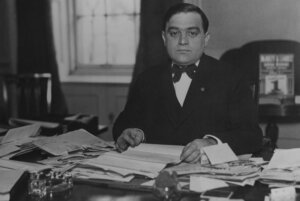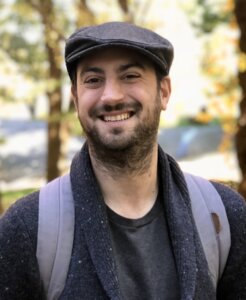George Santos’ fake ‘Jew-ish’ story is not the most troubling lie he told
In questioning Santos’ ‘Jew-ishness,’ critics are overlooking a much more important story

George Santos votes for Representative Kevin McCarthy on Jan. 4, 2023.
There’s a gay Jewish Latino first-generation American in an important U.S. legislative body. The elected official, of course, is not George Santos; it’s Daniel Hernández.
Daniel and his sister Alma are Democratic members of the Arizona House of Representatives. They didn’t grow up Jewish but embraced the religion after learning their grandfather had changed the family name in Mexico from Cohen to Quiñones. Alma converted; Daniel didn’t, but still celebrates Jewish holidays and attends his family’s synagogue.
Two weeks ago, I broke the story for the Forward that George Santos lied about his grandparents being Ukrainian and Belgian Jews who fled to Brazil escaping Hitler in 1940.
When The New York Times revealed that the congressman invented large swaths of his resume and backstory, I was working on an article about a Holocaust survivor from Ukraine whose family coincidently lives in Santos’ district. I was aware of Jews like Daniel and Alma Hernández, but Santos’ Holocaust story sounded fishy, and if it was true, I was confident I could find proof. Instead, I discovered that Santos descended from Catholics living in Brazil since the 19th century.
My article quickly became national, then international, news. It’s one thing for a politician to fabricate his resume or have shady finances, but lying about the Holocaust for political gain crosses a line.
The following week, Santos himself responded. While he still maintained, against all evidence, that his grandparents were converts from Judaism and born in Ukraine and Belgium, he did walk back his claims of a Jewish identity.
“I never claimed to be Jewish,” Santos told the New York Post. “I said I was ‘Jew-ish.’”
It wasn’t true. The New York Republican had campaigned as a “proud American Jew.” Soon after, “Jew-ish” started trending on Twitter.
The congressman’s biggest problem is the pending state, federal and international investigations, but it’s the Jewish question that has become his PR nightmare.
Worryingly, the headlines, commentary and tweets tend to focus more on Santos lying about being “Jew-ish” than about his grandparents being refugees. The Republican Jewish Coalition denounced Santos because he “misrepresented his heritage” without mentioning the Holocaust. The New York Times ran an op-ed titled “Why did George Santos lie about being Jewish?”
But Santos faking being Jewish is secondary to the larger lie that his grandparents were Holocaust survivors. It fits into a pattern of the congressman appropriating the suffering and tragedy of others. He also claimed without proof that he lost four employees in the anti-gay Pulse nightclub shooting and that his mother’s 2016 death resulted from her being in the World Trade Center on 9/11.
Congressman Ritchie Torres has introduced the “George Santos Bill,” which would make it illegal for political candidates to lie about their education, past employment, or military service. Likewise, there have been calls for the press and political parties to better scrutinize politicians. One legacy of George Santos that I fear is an interrogation of any candidate who claims to be Jewish.
It’s crystal clear that Santos has no legitimate ties to Judaism, but questioning someone’s Jewish identity gets into murky waters. Some argue that real Jews must keep kosher and take harder-line positions on Israel and Iran. Israel’s far-right government plans to follow the Orthodox belief that Jewishness is passed through the mother, not the father. And when it comes to Jews of color and converts, inquiries into their identity are often humiliating or outright racist.
Some compare Santos to New York state Senator Julia Salazar, who in 2018 campaigned as an immigrant Jew. At the time, Tablet reporter Armin Rosen tracked down the senator’s brother, who said the family was Catholic and she was born in Florida. Salazar explained to Jewish Currents that she converted to Judaism in her 20s after learning of the Sephardic roots of her last name. Most importantly, unlike Santos, Salazar was active in Jewish life for years.
Salazar is one of many Latin Americans who have discovered that their ancestors were Marranos: Spanish or Portuguese who concealed their Jewish identities during the Middle Ages. As a result, some have converted or connected to Judaism in meaningful ways. For others like Alexandria Ocasio-Cortez, it’s one part of her diverse family background. In 2018, she told a Queens synagogue that “generations and generations ago, my family consisted of Sephardic Jews.”
If Santos had been prudent, he could have made a similar appeal to Jewish voters. Caruso, his grandmother’s maiden name, has Sephardic roots.
In the future, there will be more political figures like Daniel and Alma Hernandez with non-traditional Jewish backgrounds. Some in the Jewish community will remember Santos and go on the attack. And if there’s a dubious family Holocaust story, I’ll be the first to dig through genealogical records. But Jews should be open-minded and welcoming of people who feel connected to Judaism, even if they’re not Goldbergs or Levys.

This phenomenon isn’t anything new, though. Depression-era New York mayor Fiorello LaGuardia was born to a Catholic father and a Jewish mother.
LaGuardia, who attended church, campaigned in Yiddish. His sister Gemma, who married a Hungarian Jew, was interned in Nazi concentration camps. He certainly had Jewish credentials. Yet, it wasn’t until after he was elected that the mayor was outed as a Jew.
When asked why he never discussed it, he explained, “I never thought I had enough Jewish blood in my veins to justify boasting about it.”

















